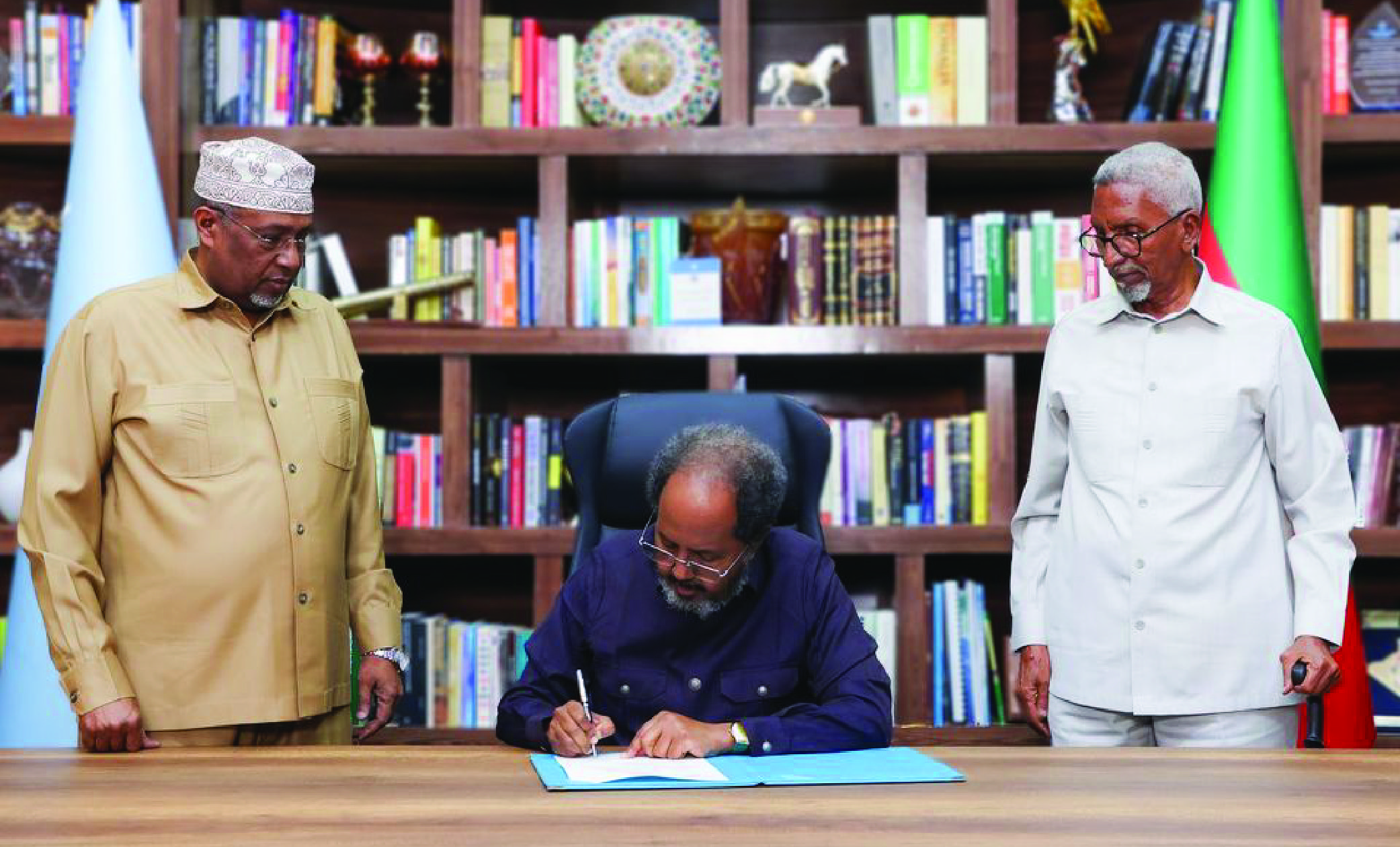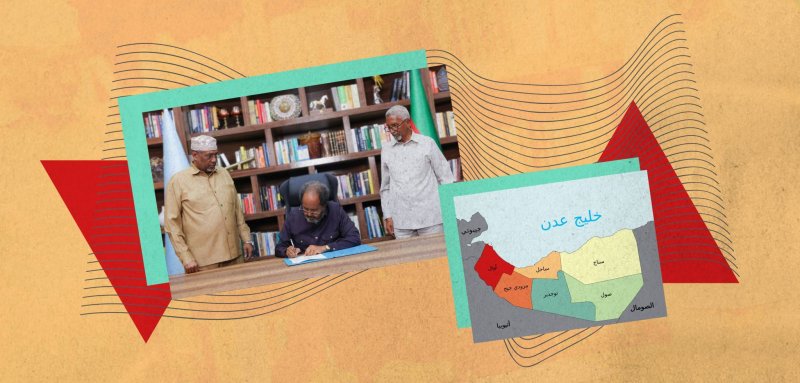The Horn of Africa – Djibouti, Eritrea, Somalia, and Ethiopia – is in many ways a volatile region. The memorandum of understanding signed by Ethiopia declaring its independence in 1991 from the Somali state, Somaliland, is now posing a significant threat to the stability in the fragile region.

According to the memorandum, Ethiopia obtains an area of 20 square kilometers of coastline along the Gulf of Aden, on lease for a period of 50 years, with the possibility of extension in order to construct military bases and possibly, seaports. In return, Ethiopia recognizes Somaliland as an independent state and grants it a share in Ethiopian telecommunications or aviation companies, according to details from the memorandum, the official text of which has not been published.
What are the implications of the agreement between Ethiopia and Somalia? What is Egypt's stance on it? And how might it affect the country of Somalia?
The Ethiopian dream
In early January 2024, the Ethiopian and Somaliland governments signed a memorandum of understanding granting Ethiopia a maritime outlet in exchange for certain financial benefits and recognition of Somaliland (officially the Republic of Somaliland). The signing came two days after a meeting between Somali President Hassan Sheikh Mohamud and the head of the separatist Somaliland region, Muse Bihi Abdi, in Djibouti, under the auspices of Djibouti President Ismail Omar Guelleh. The staats agreed to “resume dialogue with a focus on the existential issues to reach a permanent solution.”
After the collapse of the central state in Somalia in 1991, the northern Somaliland region unilaterally declared independence, and since then, regional leaders have sought international recognition, without much significant progress. In 2004, the government formed in Somalia with the sponsorship of UN, international, and regional organizations gained international recognition as the legitimate authority for the entire Somali territory according to the borders of 1991, including Somaliland.
Under the memorandum, Ethiopia obtains an area along the Gulf of Aden on lease for 50 years, which can be extended to build military bases and possibly seaports. In return, Ethiopia recognizes Somaliland as an independent state and grants it a share in Ethiopian telecommunications or aviation companies
On the other hand, Ethiopia's quest for a new maritime outlet has not stopped since it lost its maritime outlet to Eritrea after it gained independence following the war which lasted from 1961 to 1991. Ethiopia became the second most populous country on the continent, a landlocked state entirely dependent on Djibouti’s ports for foreign trade and maritime shipping, incurring hefty taxes and fees. A maritime outlet has remained a ‘national dream’ for many Ethiopians. With the signing of the memorandum of understanding with Somaliland, maritime access has become possible, although achieving this poses near-impossible challenges.
Hassan Sheikh Ali, a researcher from Somalia, says that Ethiopia's promises to recognize Somaliland's independence are just an illusion sold by Prime Minister Abiy Ahmed. He points out that even if Ethiopia believes it will fulfill its promise, it would not change anything. Ali explains to Raseef22, “Muse Bihi wants the memorandum of understanding to divert attention from his military failures in the Sool and Sanaag regions, and to market himself again by appealing to the feelings of Somaliland residents who share the dream of gaining recognition for their region's independence.”
2023 was a difficult year for President Muse Bihi Abdi of Somaliland as the country faced internal political problems that almost escalated into armed civil conflicts, in addition to the army’s defeat in Sool and Sanaag after an armed revolution led by residents of these regions who demanded separation from Somaliland, in favor or joining Somalia.
According to the declared details of the memorandum of understanding, the region to be granted as a lease to Ethiopia for 50 years has not been specified, nor what the nature of the lease will be. In a televised interview, Ethiopian National Security Advisor, Redwan Hussein, said “Ethiopia has not yet recognized Somaliland. But we will see how they progress, and then we start evaluating the recognition issue at the right time. This is contingent on obtaining a land and sea base for 50 years. In general terms, the promised recognition of Somaliland is just a work in progress, more work needs to be done.” Hussein revealed the region that Ethiopia wishes to lease is Loghi in the Awdal province, north of Somaliland, which shares international borders with Djibouti and overlooks the Gulf of Aden.
The Somali response
All levels of governance in Somalia –the president, the government, and the federal parliament– issued strong statements condemning the signing of the memorandum of understanding. Mogadishu also summoned its ambassador from Addis Ababa for consultations.
Protests against the memorandum of understanding took place in many Somali cities and even within Somaliland. Abdul Ghani Mahmoud Atiye, Somaliland’s Minister of Defense, resigned in protest and criticized the memorandum.
A journalist from Somaliland, who asked to remain anonymous, tells Raseef22, “Muse Bihi surprised us by signing. This issue has caused us distress, and I believe people here will fight each other due to the intensity of tension between the supporters and opponents of the memorandum.” The source explains that “tribes have started arming themselves in preparation to resist any Ethiopian presence,” and warned of “extreme Islamist groups exploiting the event to establish a foothold in the region and declare war against his government.” According to the source, the memorandum of understanding will not reach the regional parliament and will not pass.
Al-Shabaab, classified as a terrorist group, has exploited the events in the region, calling for what it described as ‘jihad’ against the government of Somaliland and Ethiopia. It also organized protests by residents in areas under its control to denounce the memorandum.
Historically, there has been hostility between Somalis and the Ethiopian state, with both parties engaging in wars against each other for decades. In the last century, Ethiopia annexed the western Somali region (Ogaden) in agreement with Britain. After Somalia gained independence, the Ogaden War erupted between Somalia and Ethiopia (in 1977 and 1978), in which the United States, the Soviet Union, Egypt, Cuba, and South Yemen intervened, resulting in Somalia's defeat.
Elmi Ahmednour, a Somali researcher, says, “Ethiopia's dream of having a seaport in Somali territories is an old one,” which it had previously negotiated for with colonial powers. He tells Raseef22 that Ethiopia's demands calmed after annexing Eritrea following its independence from Italy, but aspirations of maritime access resurfaced after losing this port following Eritrea's independence in 1991.
The signing of the memorandum of understanding between Somaliland and Ethiopia may prompt Somalia to grant Egypt the right to establish a naval base, with popular approval, amid growing relations and security and military cooperation between the two countries
President Hassan Sheikh of Somalia held a meeting of the National Advisory Council in which he emphatically condemned and rejected the memorandum. The Federal Parliament, with both chambers, also issued a decision considering the memorandum of understanding null and void, signed by the President.
President Bihi of Somaliland visited Ethiopia again after signing the memorandum. However, this time he visited the western Somali region (one of the regions of the federal state of Ethiopia). The Chief of Staff of the Somaliland’s army, General Nuh Ismail, also visited Addis Ababa and met with his Ethiopian counterpart, Birhanu Jula. According to a statement issued by the Ethiopian Ministry of Defense, the meeting discussed a range of issues, notably military cooperation between Ethiopia and the Somali region. In Ethiopia, large rallies in support of the memorandum took place.
Rallying allies
The reaction was not limited to Somalia; Ethiopia's access to the Red Sea is a regional issue involving Egypt, Eritrea, Djibouti, and all the Red Sea countries. Over the past year, Egypt, Djibouti, and Eritrea have become closer and more coordinated in confronting Ethiopia, following a temporary alliance between Eritrea and Ethiopia against the Tigray People's Liberation Front, and each country has its interests in constraining Ethiopia.
Hours after signing the memorandum, President Hassan Sheikh Mohamud made a phone call to Egyptian President Abdel Fattah el-Sisi, who affirmed Egypt's support for the sovereignty, unity, and stability of Somalia. The Egyptian Ministry of Foreign Affairs issued a statement emphasizing the rejection of any infringement on the sovereignty of the state of Somalia, considering Somaliland as part of Somalia according to international law. Days later, a high-level Egyptian delegation visited Mogadishu and met with the Somali president to deliver an official invitation to visit Egypt.
The UAE will benefit from the access of its ally Ethiopia to the Red Sea, although it will also take a hit if Ethiopia seeks to build a commercial seaport. In 2018, DP World, a Dubai-based company, and the governments of Somaliland and Ethiopia signed an agreement to develop and operate the major Berbera port in Somaliland, connecting it to Ethiopian territories, with profit-sharing between the company and the two governments.
However, it can be said that the signing of the memorandum of understanding between Somaliland and Ethiopia may prompt Somalia to grant Egypt the right to establish a naval base amid growing relations between the two countries since the election of Hassan Sheikh Mohamud as president in May 2022. According to local and international reports, Egypt is training three thousand Somali soldiers, and a rapid increase in security and military cooperation between the two countries is expected.
President of Somalia Hassan Sheikh Mohamud visited Eritrea, where he met with President Isaias Afwerki. According to the Eritrean Foreign Ministry, “the two presidents agreed to work strongly through bilateral and integrative cooperation and within a broader regional framework, with patience and a constructive spirit, while refraining from taking a reactive stance towards various provocative agendas.”
Djibouti's Foreign Ministry also issued a statement, –as the head of the Intergovernmental Authority on Development (IGAD), which includes Ethiopia, Somalia, and Eritrea– which confirmed its commitment to “strongly protecting the sovereignty, unity, and independence of the territories of all member states, which is the basis of the Constitutive Act of the African Union.” In addition, Sudan, the Arab League, the Arab Parliament, the European Union, the African Union Commission, Turkey, Britain, Denmark, and many other countries expressed respect for the independence and sovereignty of Somalia.
Turkey’s stance is significant due to the presence of a Turkish military base and significant military cooperation between Ankara and Mogadishu. Turkey is expected to take a strong supportive stance towards Mogadishu, and it is likely that the two countries will consult with Mogadishu in light of the Turkish-Egyptian rapprochement. The United States also expressed concern about the tensions in the Horn of Africa region and called for a diplomatic conflict resolution.
The United Arab Emirates, which has strong ties with Somaliland and Ethiopia, has not made its position clear yet. On the one hand, the UAE will benefit from the access of its ally Ethiopia to the Red Sea, although it could also be negatively impacted if Ethiopia seeks to build a commercial seaport. In 2018, DP World, a Dubai-based company, and the governments of Somaliland and Ethiopia signed an agreement to develop and operate the major Berbera port in Somaliland, connecting it to Ethiopian territories, with profit-sharing between the company and the two governments. However, according to international law and the Somali constitution, the agreement is considered void.
Raseef22 is a not for profit entity. Our focus is on quality journalism. Every contribution to the NasRaseef membership goes directly towards journalism production. We stand independent, not accepting corporate sponsorships, sponsored content or political funding.
Support our mission to keep Raseef22 available to all readers by clicking here!
Interested in writing with us? Check our pitch process here!





